Sundance Responses
-
“How’s Fitzcarraldo Going?”: Director Jennifer Kent | The Nightingale
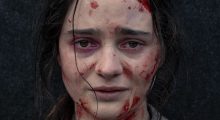
Whenever directors watch their own films, they always do so with the knowledge that there are moments that occurred during their production — whether that’s in the financing and development or shooting or post — that required incredible ingenuity, skill, planning or just plain luck, but whose difficulty is invisible to most spectators. These are the moments directors are often the most proud of, and that pride comes with the knowledge that no one on the outside could ever properly appreciate what went into them. So, we ask: “What hidden part of your film are you most privately proud of […]
by Filmmaker Staff on Jan 25, 2019 -
“Harvey Weinstein Has Been Living in My Head”: Director Ursula Macfarlane | Untouchable
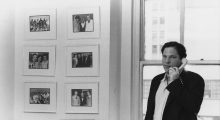
Whenever directors watch their own films, they always do so with the knowledge that there are moments that occurred during their production — whether that’s in the financing and development or shooting or post — that required incredible ingenuity, skill, planning or just plain luck, but whose difficulty is invisible to most spectators. These are the moments directors are often the most proud of, and that pride comes with the knowledge that no one on the outside could ever properly appreciate what went into them. So, we ask: “What hidden part of your film are you most privately proud of […]
by Filmmaker Staff on Jan 25, 2019 -
“Probably Only Especially Delightful to My Producing Partner and to Me”: Director Matt Tyrnauer | Where’s My Roy Cohn?
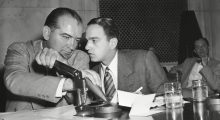
Whenever directors watch their own films, they always do so with the knowledge that there are moments that occurred during their production — whether that’s in the financing and development or shooting or post — that required incredible ingenuity, skill, planning or just plain luck, but whose difficulty is invisible to most spectators. These are the moments directors are often the most proud of, and that pride comes with the knowledge that no one on the outside could ever properly appreciate what went into them. So, we ask: “What hidden part of your film are you most privately proud of […]
by Filmmaker Staff on Jan 25, 2019 -
“Are We Comparing Trimming Unnecessary Footage with Murdering One’s Infant Child?”: Director Penny Lane | Hail Satan?

Whenever directors watch their own films, they always do so with the knowledge that there are moments that occurred during their production — whether that’s in the financing and development or shooting or post — that required incredible ingenuity, skill, planning or just plain luck, but whose difficulty is invisible to most spectators. These are the moments directors are often the most proud of, and that pride comes with the knowledge that no one on the outside could ever properly appreciate what went into them. So, we ask: “What hidden part of your film are you most privately proud of […]
by Filmmaker Staff on Jan 25, 2019 -
“To Revisit Such a Traumatic Experience for the Sake of Our Movie”: Director Lulu Wang | The Farewell

Whenever directors watch their own films, they always do so with the knowledge that there are moments that occurred during their production — whether that’s in the financing and development or shooting or post — that required incredible ingenuity, skill, planning or just plain luck, but whose difficulty is invisible to most spectators. These are the moments directors are often the most proud of, and that pride comes with the knowledge that no one on the outside could ever properly appreciate what went into them. So, we ask: “What hidden part of your film are you most privately proud of […]
by Filmmaker Staff on Jan 25, 2019 -
“Ways to Best Utilize the Unfortunate and Bizarre Cards We Were Dealt”: Director Ben Berman | Untitled Amazing Johnathan Documentary

Whenever directors watch their own films, they always do so with the knowledge that there are moments that occurred during their production — whether that’s in the financing and development or shooting or post — that required incredible ingenuity, skill, planning or just plain luck, but whose difficulty is invisible to most spectators. These are the moments directors are often the most proud of, and that pride comes with the knowledge that no one on the outside could ever properly appreciate what went into them. So, we ask: “What hidden part of your film are you most privately proud of […]
by Filmmaker Staff on Jan 25, 2019 -
“I was Amazed That We Got Permission to Film in Russia”: Directors Jennifer Baichwal, Nicholas de Pencier and Edward Burtynsky | Anthropocene – The Human Epoch
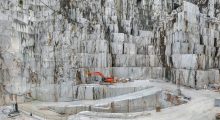
Whenever directors watch their own films, they always do so with the knowledge that there are moments that occurred during their production — whether that’s in the financing and development or shooting or post — that required incredible ingenuity, skill, planning or just plain luck, but whose difficulty is invisible to most spectators. These are the moments directors are often the most proud of, and that pride comes with the knowledge that no one on the outside could ever properly appreciate what went into them. So, we ask: “What hidden part of your film are you most privately proud of […]
by Filmmaker Staff on Jan 25, 2019 -
“Roll a Hospital Bed Down the Busiest Intersection of Koreatown”: Director Justin Chon | Ms. Purple

Whenever directors watch their own films, they always do so with the knowledge that there are moments that occurred during their production — whether that’s in the financing and development or shooting or post — that required incredible ingenuity, skill, planning or just plain luck, but whose difficulty is invisible to most spectators. These are the moments directors are often the most proud of, and that pride comes with the knowledge that no one on the outside could ever properly appreciate what went into them. So, we ask: “What hidden part of your film are you most privately proud of […]
by Filmmaker Staff on Jan 25, 2019 -
“As a Young Filmmaker You Discover Editing Only by Accident”: Editor Yannis Chalkiadakis on Pity
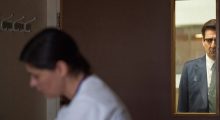
Yannis Chalkiadakis has been an editor of advertisements, shorts and feature films since 1993. His recent credits include Interruption (2015, Venice), A Woman’s Way (2009, Berlin) and L (2012, Sundance). He edited that last film for Babis Makridis, who returned to Sundance this year for his dark comedy Pity. Chalkiadakis speaks with Filmmaker below on the parallels between editing and sculpture, the influence of Hitchcock on his work and why, when it comes to editing, “it’s not the software that counts.” Filmmaker: How and why did you wind up being the editor of your film? What were the factors and […]
by Filmmaker Staff on Jan 30, 2018 -
“A Mournful Look that Subtly Highlighted the Character’s Main Struggle”: DP Konstantinos Koukoulios on Pity

Greek director Babis Makridis premiered his debut feature L at the Sundance Film Festival in 2012. He returned to the festival this year for his follow-up, the dark comedy Pity co-written by the co-writer of Yorgos Lanthimos’s films. The film stars Yannis Drakopoulos as a self-absorbed sad-sack addicted to the pity of others. Pity was shot by Konstantinos Koukoulios, here making his debut as a DP of features. Koukoulios spoke with Filmmaker about the influence of Edward Hopper on the movie, lighting a forest at night and his primary aesthetic goal: to make a film about sadness that doesn’t look sad. Filmmaker: How and why did […]
by Filmmaker Staff on Jan 30, 2018
